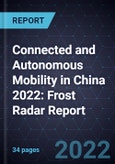A Benchmarking System to Spark Companies to Action - Innovation that Fuels New Deal Flow and Growth Pipelines
China's autonomous and connected mobility market is undergoing a transition. The top challenges it faces include technical obstacles, such as perception technology and control algorithms; data privacy, protection, and security laws and regulations issued in the pre-autonomous driving era; and high manufacturing and operating costs. As a result, many industry participants are moving to devise a more sustainable business model.
The publisher sees an opportunity for industry players to deploy autonomous driving solutions beyond the passenger vehicle space, such as in intelligent mining and fully automated ports. End customers in these fields usually have higher payment capability and more adoption willingness as compared to passenger car OEMs.
So far, the Chinese government has approved self-driving tests and pilot operations in about thirty cities and approved commercial robotaxi use without a safety driver in Chongqing and Wuhan. It is crucial for autonomous driving solution providers to get a foothold in these cities and accumulate accurate data for operational vehicles under real and complex road conditions.
Another roadblock is supply chains. Autonomous vehicles require significantly more chips and semiconductors than regular vehicles, prompting the industry to order surplus chips and semiconductors to ensure inventory. However, the global chip shortage continues to worsen, influenced by the US banning the export of high-end chips, tools, and components to China. To compensate, market participants must integrate the supply chain by collaborating with local qualified chip partners. Key market players who also manufacture high-end chips, such as Baidu and NavInfo, invest heavily in product development to break the technological advancement barrier.
Key connected and autonomous mobility market participants are diverse; they include tech companies, start-ups, and Tier I and II automotive suppliers. The publisher independently plotted the top 10 companies in this Frost Radar. The analysis features Huizhou Desay SV Automotive (Desay SV), Neusoft Corporation (Neusoft), Beijing Jingwei Hirain Technologies (Hirain), Pony.AI, Baidu, Alibaba Group Holding Limited (Alibaba), Haomo Zhixing Technology (Haomo.AI), NavInfo, Shenzhen Deeproute.ai (Deeproute.AI), and Guangzhou Weride Technology (WeRide).
The Frost Radar reveals the market positioning of companies in an industry using their Growth and Innovation scores as highlighted in the Frost Radar methodology. The document presents competitive profiles of each company based on its strengths, opportunities, and a small discussion on its positioning. The publisher analyzes hundreds of companies in the industry and benchmarks them across different criteria, where the leading companies are then positioned on the Radar. Industry leaders on both the Growth and Innovation indices are recognized as best practice recipients.
Table of Contents
1. Strategic Imperative and Growth Environment
- Strategic Imperative
- Growth Environment
2. Frost Radar
- Frost Radar: Connected & Autonomous Mobility Market
- Frost Radar: Competitive Environment
3. Companies to Action
- Alibaba
- Baidu
- DeepRoute.AI
- Desay SV
- HAOMO.AI
- Hirain Technologies
- NavInfo
- Neusoft
- Pony.AI
- WeRide
4. Strategic Insights
5. Next Steps: Leveraging the Frost Radar to Empower Key Stakeholders
- Significance of Being on the Frost Radar
- Frost Radar Empowers the CEO's Growth Team
- Frost Radar Empowers Investors
- Frost Radar Empowers Customers
- Frost Radar Empowers the Board of Directors
6. Frost Radar Analytics
- Frost Radar: Benchmarking Future Growth Potential
- Legal Disclaimer
Companies Mentioned (Partial List)
A selection of companies mentioned in this report includes, but is not limited to:
- Alibaba
- Baidu
- DeepRoute.AI
- Desay SV
- HAOMO.AI
- Hirain Technologies
- NavInfo
- Neusoft
- Pony.AI
- WeRide








